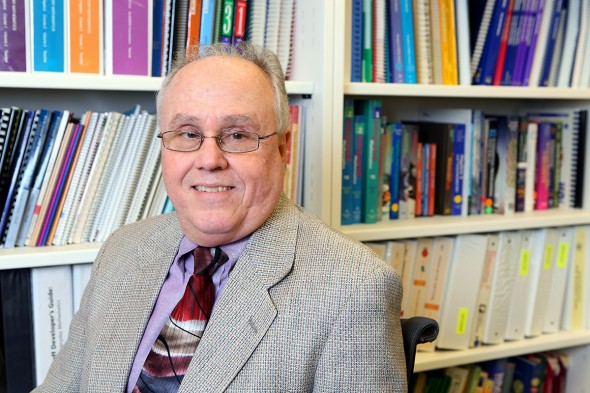Thinking about how students, teachers learn

James Pellegrino helps researchers collaborate as co-director of UIC’s Learning Sciences Research Institute. Photo: Jenny Fontaine/UIC Public Affairs
A university is all about learning, and so is UIC’s Learning Sciences Research Institute.
But why is something like the institute needed here?
Co-director James Pellegrino has the answer:
“Institutes like LSRI serve to bring together researchers from multiple disciplines to work on multidisciplinary and interdisciplinary projects that might not otherwise get envisioned and pursued by faculty working in separate departments and colleges,” he said.
“It serves as a catalyst for such collaborations.”
The learning sciences institute is home to more than 130 staff, students, faculty and researchers in the learning sciences field.
“The focus is as much on teachers learning as on students learning,” said Pellegrino, distinguished professor of liberal arts and sciences and education.
“We look at what it takes for a teacher to effectively teach mathematics, for example — and what it takes for them to learn new practices and teach in line with Common Core (state) standards.”
The institute doesn’t just do general research on learning, but homes in on specific areas like math, chemistry or one of the social sciences, Pellegrino said.
“The work we do is on everything from the elementary grades to post-secondary,” he said.
The learning institute brings together faculty from multiple disciplines. “My appointment is 75 percent psychology and 25 percent curriculum and instruction,” Pellegrino said.
Others, for example, have joint faculty appointments in both learning sciences and chemistry or computer science. “We have 14 faculty with various different academic affiliations who are involved in learning sciences,” he said.
For the National Research Council of the National Academies, Pellegrino was a member of the Committee on Defining Deeper Learning for 21st Century Skills. He co-edited a report on its findings.
“We tried to figure out what was meant by ‘deeper learning’ and ‘21st century skills,’” he said. “What does the research base tell us? Is there evidence that they matter in the workplace and adult life?”
The committee concluded that deeper learning produces transfer — “it allows you to use your knowledge in real situations,” he said.
As for 21st century skills, the committee decided that they fall into the cognitive domain — reasoning, problem solving and critical thinking — complemented by interpersonal competence (the ability to communicate and engage in teamwork) and intrapersonal competence (being able to monitor, direct and communicate one’s own activities and exercise persistence).
“The report tries to spell out evidence for competencies and their importance — are they teachable?” Pellegrino said. “An important piece of the report is whether they’re reflected in new standards in different disciplines, and the answer is, yes they are.”
The Learning Sciences Research Institute has its roots in two other centers. When Pellegrino came to UIC in 2001, there was a Center for the Study of Learning and an Institute for Math and Science Education.
“It made sense to merge the two,” he said.
The learning sciences institute is supported by the colleges of Education, Engineering and Liberal Arts and Sciences.
Pellegrino was born in Brooklyn and lived there until he was 6, then moved to Westchester County.
He earned his bachelor’s degree from Colgate University, in upstate New York, and master’s and Ph.D. degrees from the University of Colorado Boulder. He taught at the University of Pittsburgh for six years, University of California, Santa Barbara, for 10 years, and Vanderbilt University for 12 years before joining UIC.
Pellegrino’s honors include Phi Beta Kappa, scholarships from Colgate and the New York State Regents, and the Phil R. Miller Award in Psychology. He’s a member of the Outstanding Young Men in America and a National Academy of Sciences lifetime national associate.
“I’m a sports nut,” said Pellegrino, who follows the Cubs and White Sox, Bulls, Blackhawks and Bears. He played golf and skied in his younger days.
He lives downtown, across from Millennium Park, with his wife, Susan Goldman, co-director of the Learning Sciences Research Institute.
He has a son from a previous marriage, Christopher, 43, who is in the construction industry in Syracuse, N.Y. Goldman has 44-year-old twin sons from a previous marriage, Josh, an A.C. Nielsen executive, and Seth, a Los Angeles lawyer. The couple has four grandchildren.
